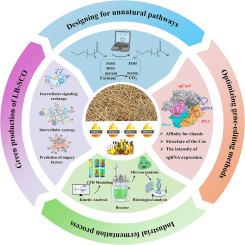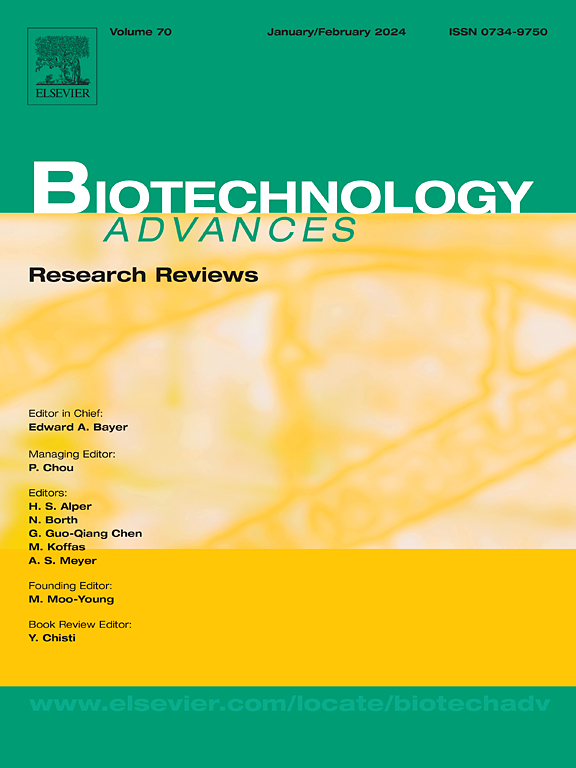From lignocellulosic biomass to single cell oil for sustainable biomanufacturing: Current advances and prospects
IF 12.1
1区 工程技术
Q1 BIOTECHNOLOGY & APPLIED MICROBIOLOGY
引用次数: 0
Abstract
As global temperatures rise and arid climates intensify, the reserves of Earth's resources and the future development of humankind are under unprecedented pressure. Traditional methods of food production are increasingly inadequate in meeting the demands of human life while remaining environmentally sustainable and resource-efficient. Consequently, the sustainable supply of lipids is expected to become a pivotal area for future food development. Lignocellulose biomass (LB), as the most abundant and cost-effective renewable resource, has garnered significant attention from researchers worldwide. Thus, bioprocessing based on LB is appearing as a sustainable model for mitigating the depletion of energy reserves and reducing carbon footprints. Currently, the transformation of LB primarily focuses on producing biofuels, such as bioethanol, biobutanol, and biodiesel, to address the energy crisis. However, there are limited reports on the production of single cell oil (SCO) from LB. This review, therefore, provides a comprehensive summary of the research progress in lignocellulosic pretreatment. Subsequently, it describes how the capability for lignocellulosic use can be conferred to cells through genetic engineering. Additionally, the current status of saccharification and fermentation of LB is outlined. The article also highlights the advances in synthetic biology aimed at driving the development of oil-producing microorganism (OPM), including genetic transformation, chassis modification, and metabolic pathway optimization. Finally, the limitations currently faced in SCO production from straw are discussed, and future directions for achieving high SCO yields from various perspectives are proposed. This review aims to provide a valuable reference for the industrial application of green SCO production.

从木质纤维素生物质到用于可持续生物制造的单细胞油:当前进展与前景。
随着全球气温的升高和干旱气候的加剧,地球资源的储备和人类未来的发展面临着前所未有的压力。传统的粮食生产方式越来越无法在满足人类生活需求的同时保持环境可持续性和资源效率。因此,脂质的可持续供应有望成为未来粮食发展的一个关键领域。木质纤维素生物质(LB)作为最丰富、最具成本效益的可再生资源,已引起全球研究人员的极大关注。因此,基于木质纤维素的生物加工正在成为缓解能源储备枯竭和减少碳足迹的可持续模式。目前,枸杞的转化主要集中在生产生物燃料,如生物乙醇、生物丁醇和生物柴油,以应对能源危机。然而,有关从枸杞中生产单细胞油(SCO)的报道却很有限。因此,本综述全面总结了木质纤维素预处理的研究进展。随后,它介绍了如何通过基因工程赋予细胞利用木质纤维素的能力。此外,文章还概述了枸杞糖化和发酵的现状。文章还重点介绍了旨在推动产油微生物(OPM)发展的合成生物学进展,包括基因转化、底盘改造和代谢途径优化。最后,讨论了目前利用秸秆生产 SCO 所面临的限制,并从不同角度提出了实现 SCO 高产的未来方向。本综述旨在为绿色 SCO 生产的工业应用提供有价值的参考。
本文章由计算机程序翻译,如有差异,请以英文原文为准。
求助全文
约1分钟内获得全文
求助全文
来源期刊

Biotechnology advances
工程技术-生物工程与应用微生物
CiteScore
25.50
自引率
2.50%
发文量
167
审稿时长
37 days
期刊介绍:
Biotechnology Advances is a comprehensive review journal that covers all aspects of the multidisciplinary field of biotechnology. The journal focuses on biotechnology principles and their applications in various industries, agriculture, medicine, environmental concerns, and regulatory issues. It publishes authoritative articles that highlight current developments and future trends in the field of biotechnology. The journal invites submissions of manuscripts that are relevant and appropriate. It targets a wide audience, including scientists, engineers, students, instructors, researchers, practitioners, managers, governments, and other stakeholders in the field. Additionally, special issues are published based on selected presentations from recent relevant conferences in collaboration with the organizations hosting those conferences.
 求助内容:
求助内容: 应助结果提醒方式:
应助结果提醒方式:


